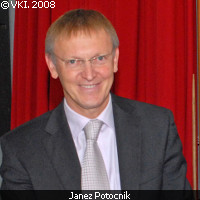Keeping focused: EC conference on HIV/AIDS, malaria and tuberculosis begins
On 13 November the European Commission opened its two-day International Conference on Poverty-Related Diseases. The conference focuses on 'the big three' global killer diseases: HIV/AIDS, malaria and tuberculosis (TB). Around 450 prominent scientists, policy makers, business representatives, NGOs (with significant participation from disease-endemic countries), international organisations and disease experts gathered in Brussels to discuss the impact and challenges of EU-funded research on controlling these diseases. In his opening speech, Commissioner Janez Potocnik said, 'AIDS, TB and malaria kill five million people each year. Do you find that a little difficult to picture? Then imagine almost all of the Danish population wiped out by infectious disease in one year. Would we tolerate that? I think we all know the answer. 'Everyone with an interest and influence needs to take responsibility,' he continued. 'We have to concentrate and be pragmatic. We have to concentrate our efforts on those actions that will have the biggest impact.' The conference aims to identify bottlenecks in research, and to clarify the role that EC-supported research can play in battling these three diseases. Commissioner Potocnik outlined the major goals of the conference: regaining political momentum for continuing and intensifying research; reporting on research efforts supported by the EC since 2002; and gathering input from relevant stakeholders to set research priorities on poverty-related diseases for the remainder of the Seventh Framework Programme (FP7). It is important, Commissioner Potocnik said, to ensure that poverty-related diseases get the attention they need. The EU's Framework Programme 6 (FP6) allocated more than EUR 450 million to research and development into new drugs, vaccines and clinical investigations for poverty-related diseases; there are now more than 80 collaborative projects involving more than 250 research groups. It is also important to identify research gaps that could be filled by FP7-supported action or by other EU initiatives, Commissioner Potocnik said, and to encourage the engagement of the public sector in a joint battle against these infectious diseases. Among other things, the conference was updated on the progress of the EDCTP (European and Developing countries Clinical Trials Partnership) Europe-Africa partnership. The EDCTP this year approved over EUR 80 million for research into HIV/AIDS, TB and malaria in Africa, which, according to Commissioner Potocnik, represents 'a boost for European investment in research into poverty-related disease and a shot in the arm for cooperation between European and African researchers'. The continuing spread of HIV infection worldwide has had devastating consequences. AIDS has claimed the lives of 20 million people in the past 20 years, and more than 40 million people are currently living with the virus. Eight million new cases of active tuberculosis (TB) are reported each year, and two million people die from the disease. It is one of the most commonly reported causes of death in people infected with HIV. Increasing multidrug resistance has become a serious factor in addressing TB as a global public health problem, and improved vaccines are desperately needed as the effectiveness of old strains diminishes. Malaria is a persistent public health problem for around 40% of the world's population; around 300 million people are infected and 1 million die of the disease every year. Resistance to anti-malarial medicines has led to an increasing number of deaths. According to the Commission, concentrated prevention and treatment efforts are still urgently needed. Commissioner Potocnik acknowledged that renewed efforts are needed to create incentives for the development and delivery of new and affordable medicines for HIV/AIDS, malaria and TB, and stressed that 'cost should not be a barrier to treatment'. He also said that launching new public-private partnerships would be beneficial to global research efforts against these diseases. He spoke about the major questions faced by policymakers, researchers and NGOs dealing with these diseases, and concluded, 'Finding the answers to these questions is both our duty and, without exaggeration, a matter of life and death for many people.'



